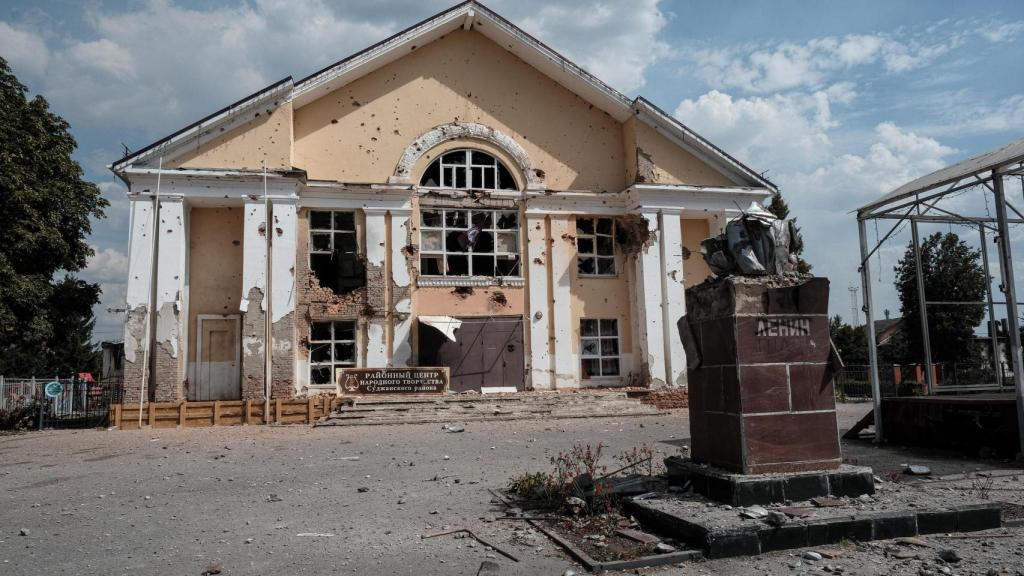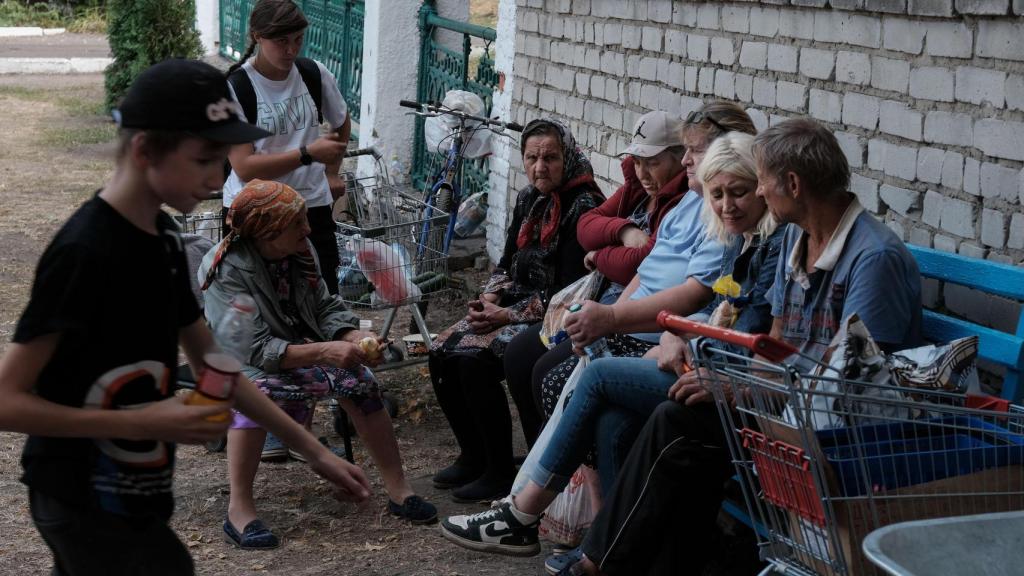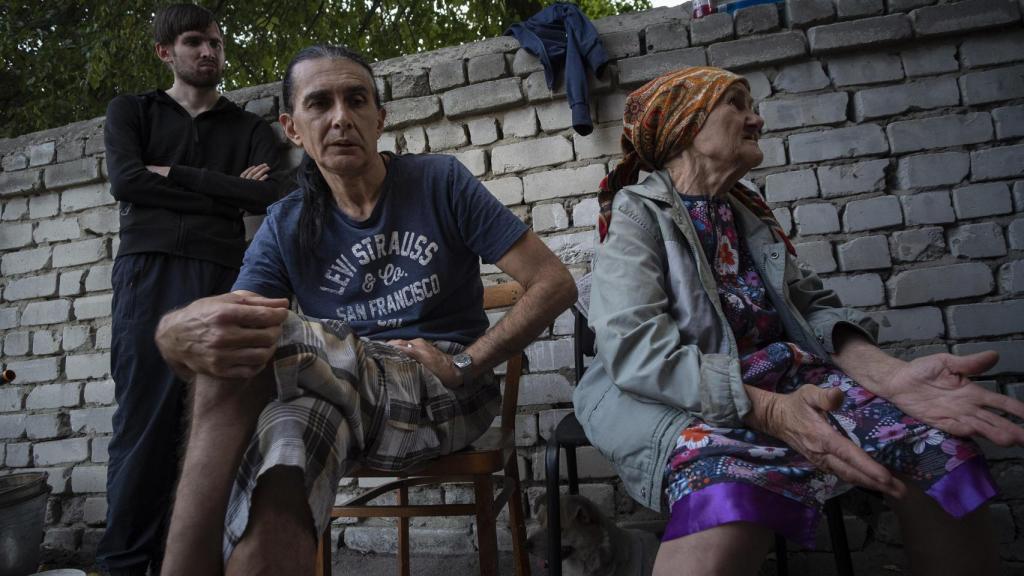To get to one of the cities that Ukraine has temporarily occupied in Russian territoryit is necessary to travel in an armored vehicle of the kind used to enter ground zero in a war. Equipped with helmets and bulletproof vests, all members of the convoy hold their breath as they cross the border crossing, whose facilities are bombed. It is the first time that a country has invaded Russia since Hitler launched the Operation Barbarossa in 1941.
Through the narrow windows of the armoured vehicle, pieces of the landscape can be seen speeding by. A bombed-out electricity pylon here, a roofless house there. We only pass a few military vehicles – Ukrainian ones – and although the road is full of potholes and we are bouncing, the atmosphere is strangely calm.
Upon arrival at Sudzhathe back door opens and we disembark in the middle of a deserted square where we see remains of urban fightingThe silence is only broken by the sound of distant bombings, which echo every few minutes, but a sense of calm prevails.
Bombed buildings in Russia’s Kursk region, seen through the window of an armored vehicle.
“We are in the process of identifying people who continue to live here, in Sudzha. We are going district by district, to Find out how many people are left and understand what they need: “If we need to bring food, medical care, special medicines,” explains Vadim, the Ukrainian Army press officer who gives us a situation report on the spot.
In front of us is the building of the Regional Administration – also bombed –, the remains of a statue of Lenin and the memorial to the end of World War II, which presides over this town located 20 kilometers from the border with Ukraine.
The Russian town of Sudzha is not very different from any Ukrainian town. Perhaps because this town, along with many other Ukrainian regions, Kursk, Bryansk, Belgorod either Rostov They belonged to Ukraine before the 1930s, when the former Soviet Union modified its borders by decree.

The building housing the Sudzha Regional Administration, in the city centre.
Summarizing this dark decade for Ukrainians, full of historical nuances, in the 1930s – and after overcoming the Holodomor that killed millions of people from hunger – Ukraine lost an area of 40,000 square kilometers Overnight, 1.2 million inhabitants of these lands were stripped of part of their identity. An identity that dates back to the 17th century, when the Cossacks founded the cities of this part of the world.
That is why, when the soldiers of kyiv occupied Kursk – on August 6 – they found that Russian old womenwho approached them to explain the situation, They spoke Ukrainian completely normally.“One of my grandmothers was from Kursk,” says Oleksyi, another of the soldiers accompanying us, when I ask him what it felt like to cross the line separating the two countries.
Far away from everything
However, most of the Sudzha residents we meet later do not remember that part of history. One of these people is Lyudmilapushing a shopping cart full of empty containers. He goes with his family to look for waterbecause in the village now they have no running water, no electricity, no telephone coverage.
“What do you think about what is happening?” another journalist asks her when the woman agrees to speak to us. The conversation that follows borders on the surreal: “I just want this to stop, I don’t understand why this happened.”Lyudmila answers.
“Hasn’t Putin told you what has been happening in Ukraine for two and a half years, hasn’t he talked to you about how people are dying there?” the journalist insists. “Only soldiers are dying”the woman says without hesitation. “Don’t you know what happened in Bucha, Irpin, Mariupol?” she makes one last attempt. “I just can’t believe it,” Lyudmila says.

Residents of the town of Sudzha wait in a shelter to be evacuated to other Russian cities.
We let Liudmila continue on her way – neither of us is going to convince the other of anything – and we arrive at a building where they gather More than 70 people are waiting to be evacuatedThe place has a huge basement, where they have installed mattresses and brought in supplies, and there they spend their time as best they can.
Most are elderly, but there are also Several families with teenagers and a childThe sticky heat of these days means that not a drop of air flows underground, and the musty smell is dizzying. So many of them are outside, sitting on wooden benches against a wall, even though the sound of the bombings does not stop.
The interaction between Sudzha residents and Ukrainian troops is tense, but they do not seem to be afraid of the “occupiers.” The soldiers ask them what they need, offer them food and ask if they know anyone else who wants to evacuate. The civilians respond harshly, but acknowledge that They are surprised by the good treatment of the Ukrainians.
“They [las tropas ucranianas] They brought us water, good food, bread and a doctor.“We haven’t done anything, we are far away from everything,” she adds. She remembers that when the offensive started they just ran to hide, and then they came to this basement. “We have nowhere else to go, many houses are destroyed and there is a lot of bombing,” she says.
Back to Moscow
Vladislav, 72, tells a similar story. “I heard gunshots in the area of the town hall, but I don’t know who fired them. Maybe there was fighting, but I don’t know anything about that,” he says. He did not evacuate because he had “neither time nor a car” to get out of here: everything happened so fast and I was stuck with my wife.” Vladislav is from Moscow, and he was in Sudzha on vacation.
A smiling old lady joins the conversation. She asks us to call her. babushka [abuela] Olga is 81 years old. “My passport is Russian, you know, but I feel Ukraine is close to me,” He starts off without losing his smile. “There are good people and bad people, both in Russia and in Ukraine.”
“The Ukrainian soldiers who have arrived here have not done anything wrong to us, but I want peace to return to both sides: to Russia and to Ukraine. I want to live my remaining years in peace… “Now I think about the mothers, the children, and this is not right. But only the leaders can stop it,” says the old woman with a mental clarity that makes us all fall silent.

Olek and babushka Olga, residents of the Russian town of Sudzha, wait outside an underground shelter for evacuation.
But one of the younger men there breaks the silence. “This would not have happened under the Soviet Union,” he says, to the astonished gaze of the Ukrainian officers. His name is Olek, he is 57 years old, and he does not hesitate to admit that he misses those times. “Forty years ago there were no problems in our country,” he adds.
In fact, Olek did not exchange his old Soviet passport for a Russian one until 2007. He waited 16 years in the hope that the USSR would returnand remains convinced that “the changes brought by democracy are not necessary…” The conversation is interrupted by a soldier who arrives running, and warns that there are Russian reconnaissance drones in the city.
We all then went down to the basement, where we remained in darkness and almost in silence for more than an hour and a half, until the armoured car appeared again and we were rushed into it. We left Sudzha in a hurry, even faster than when we entered, leaving Tamara, Vladislav, Olek and Grandma Olga there.
Humanitarian catastrophe
Evacuations have been halted for 10 days due to increased Russian bombing, which uses its planes to drop gliding bombs on cities as well. Even though they know that there are many civilians who have not yet evacuated. “If the Russians continue bombing their people, they will cause a humanitarian catastrophe.“,” says Vadim, already inside the vehicle, heading towards Ukraine.
“Bombing these civilians is an act of terrorism,” “The Ukrainian army is now most concerned about the safety of civilians in the territories we have occupied, and we are really worried about these bombings because they are increasing,” he added.
But even if evacuations – to other Russian-controlled cities – resume, there will be people who do not want to leave their homesOlder people, especially; people who have nowhere to go, and who don’t feel strong enough to start over in a strange place. Neighbours who hope that the occupation will end soon, and there is no need to leave their homes now.
Russia has already evacuated more than 200,000 people in the Kursk regionbut there will be those who stay despite everything. And for the Ukrainians, it will be a challenge to control the security conditions for the civilian population in the more than 1,260 square kilometers of Russian territory that they have already managed to conquer.


![[Img #74664]](https://thelatestnews.world/wp-content/uploads/2024/12/James-Watson-The-controversial-genius-behind-the-double-helix-150x150.jpg)










Add Comment